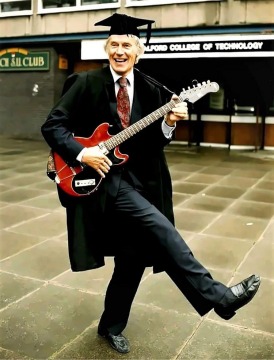Abbey Road Tribute
Today’s "Beatles People" is George Martin
 George Henry Martin was born on January 3, 1926. At the age
of six his interest in music was piqued by a piano which the Martin family
acquired. Two years later he persuaded his parents to let him have lessons,
though he only had eight due to disagreements between his mother and the
teacher. Following that, Martin taught himself to play piano.
George Henry Martin was born on January 3, 1926. At the age
of six his interest in music was piqued by a piano which the Martin family
acquired. Two years later he persuaded his parents to let him have lessons,
though he only had eight due to disagreements between his mother and the
teacher. Following that, Martin taught himself to play piano.
His passion for music grew throughout his school days,
which included watching a performance from the BBC Symphony Orchestra.
“It was absolutely magical,” said George.
“Hearing such glorious sounds I found it difficult to
connect them with 90 men and women blowing into brass and wooden instruments
or scraping away at strings with horsehair bows.”
During the war he worked as a clerk in the War Office,
and in 1943 joined the Fleet Air Arm of the Royal Navy. He remained there
until 1947, becoming a pilot and commissioned officer, though he didn’t
see combat during the war.
Martin used his war veteran’s grant to enroll at the Guildhall
School of Music and Drama between 1947 and 1950, where he studied piano
and oboe.
Coincidentally, his oboe teacher was Margaret Asher,
Jane Asher’s mother.
After graduating from Guildhall he worked at the BBC’s
classical music department, and in 1950 joined EMI as an assistant to Parlophone
boss Oscar Preuss. At that time Parlophone, a German EMI imprint, was largely
seen as a novelty label of little relevance.
Martin took over as head of Parlophone in 1955. His greatest
successes came with comedy and novelty records from artists including the
Goons, Rolf Harris, Flanders and Swann and, most successfully, the Beyond
the Fringe show, starring Peter Cook, Dudley Moore, Alan Bennett and Jonathan
Miller.
Wishing to capitalize on the popular UK rock ‘n’
roll scene, he began looking for a group to work with.
Martin was told about Brian Epstein, who was managing
a pop group that had been turned down by the majority of labels including
Decca. He arranged to meet Epstein in February 1962, where he heard the
Decca recordings, which he thought “unpromising”. He did, however, think
well of John and Paul’s vocals.
The pair met again in May at Abbey Road, where they agreed
a contract without Martin having met The Beatles or seen them perform.
The contract, which he felt gave him “nothing to lose”, promised The Beatles
a royalty of one penny for each record sold.
George Martin agreed to sign the contract only when he
had heard an audition from the band. This took place on June 6, 1962. Martin
was not present at the session, but did meet the band and listened to the
recordings.
While he thought the band’s original songs below par,
he was impressed by their wit.
The Beatles returned on September 4 with Ringo, for their
first session with George Martin. He made them record ‘How Do You Do It’,
which the band reluctantly agreed to, along with ‘Love Me Do’ and a slower
version of ‘Please Please Me’.
Unhappy with Ringo’s drumming, Martin made them re-record
Love Me Do a week later with session drummer Andy White. When it reached
number 17 in the charts, Martin brought them back into the studio to record
a follow-up.
Please Please Me was recorded in November 1962. At the
end of the session, he addressed the band from the control room, telling
them: “Gentlemen, you have just made your first number one record.”
And the rest is history.

